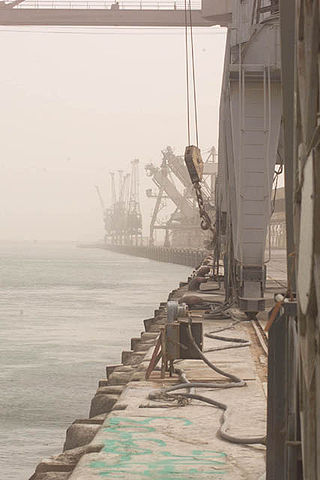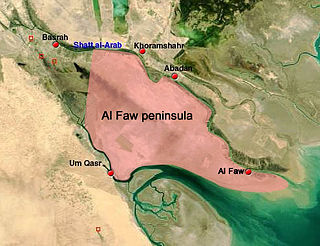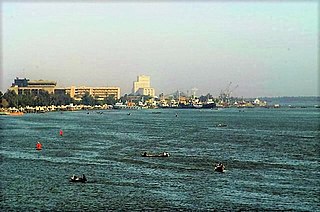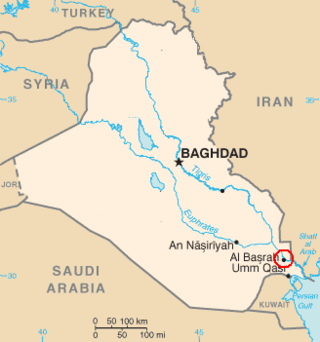Related Research Articles

Basra is a city in southern Iraq. It is the capital and largest city of the eponymous Basra Governorate, as well as the third largest city in Iraq overall, behind only Baghdad and Mosul. Basra is located near the Iran–Iraq border at the northeasternmost extent of the Arabian Peninsula, situated along the banks of the Shatt al-Arab that empties into the Persian Gulf. The majority of the city's population are Shia Muslim Arabs. Basra is consistently one of the hottest cities in Iraq, with summer temperatures regularly exceeding 50 °C (122 °F). The hottest recorded temperature in Basra is 53.9 °C.

Umm Qasr is a port city in southern Iraq. It stands on the canalised Khawr az-Zubayr, part of the Khawr Abd Allah estuary which leads to the Persian Gulf. It is separated from the border of Kuwait by a small inlet. A bridge across the waterway linked the port with Kuwait prior to the 1991 Persian Gulf War.

Basra Governorate, also called Basra Province, is a governorate in southern Iraq in the region of Arabian Peninsula, bordering Kuwait to the south and Iran to the east. The capital is the city of Basra, located in the Basrah district. Other districts of Basra include Al-Qurna, Al-Zubair, Al-Midaina, Shatt Al-Arab, Abu Al-Khaseeb and Al-Faw located on the Persian Gulf. It is the only governorate with a coastline.

Samawah or As-Samawah is a city in Iraq, 280 kilometres (174 mi) southeast of Baghdad.

Amarah, also spelled Amara, is a city in south-eastern Iraq, located on a low ridge next to the Tigris River waterway south of Baghdad about 50 km from the border with Iran. It lies at the northern tip of the marshlands between the Tigris and Euphrates.
The Rumaila oil field is a super-giant oil field located in southern Iraq, approximately 50km to the south west of Basra City. Discovered in 1953 by the Basrah Petroleum Company (BPC), an associate company of the Iraq Petroleum Company (IPC), the field is estimated to contain 17 billion barrels, which accounts for 12% of Iraq's oil reserves, estimated at 143 billion barrels. Rumaila is said to be the largest oilfield ever discovered in Iraq and one of the three largest oilfields in the world.

The Iraqi Naval Forces, or the Iraqi Navy, is the naval warfare service branch of the Armed forces of Iraq. Formed in 1937, initially as the Iraqi Coastal Defense Force, its primary responsibilities was the protection of Iraq's coastline and offshore assets, the official name was changed on 12 January 2005 to Iraqi Naval Forces.

The University of Basra is situated in the city of Basra, Iraq. For historic reasons the final -h is retained on Basrah in the name of the university.

The First Battle of al-Faw was a battle of the Iran–Iraq War, fought on the al-Faw peninsula between 10 February and 10 March 1986. The Iranian operation is considered to be one of Iran's greatest achievements in the Iran–Iraq War. The Iranians were able to capture the al-Faw peninsula, cutting off Iraqi access to the Persian Gulf in the process; this in turn hardened Iraqi attitudes to prosecute the war. The Faw peninsula was later recaptured by Iraqi forces near the end of the war.
The Battle of the Marshes was a part of the Iran–Iraq War.

The Mesopotamian Marshes, also known as the Iraqi Marshes, are a wetland area located in Southern Iraq and southwestern Iran as well as partially in northern Kuwait. The marshes are primarily located on the floodplains of the Euphrates and Tigris rivers bound by the cities of Basra, Nasiriyah, Amarah and a portion of southwestern Iran and northern Kuwait. Historically the marshlands, mainly composed of the separate but adjacent Central, Hawizeh and Hammar Marshes, used to be the largest wetland ecosystem of Western Eurasia. The unique wetland landscape is home to the Marsh people, who have developed a unique culture tightly coupled to the landscape – harvesting reeds and rice, fishing and herding water buffalo.

The Battle of Basra lasted from 21 March to 6 April 2003 and was one of the first battles of the 2003 invasion of Iraq. The British 7 Armoured Brigade fought their way into Iraq's second-largest city, Basra, on 6 April coming under constant attack by the Iraqi Army 51st Division and Fedayeen Saddam, while elements of the Parachute Regiment cleared the 'old quarter' of the city that was inaccessible to vehicles. Entering Basra had only been achieved after two weeks of conflict, which included the biggest tank battle of the war by British forces when the Royal Scots Dragoon Guards destroyed 14 abandoned Iraqi tanks on the 27 March.

The Battle of Basra began on 25 March 2008, when the Iraqi Army launched an operation to drive the Mahdi Army militia out of the southern Iraqi city of Basra. The operation was the first major operation to be planned and carried out by the Iraqi Army since the invasion of 2003.

The 2008 Iraq spring fighting was a series of clashes between the Mahdi Army and allies and the Iraqi Army supported by coalition forces, in southern Iraq and parts of Baghdad, that began with an Iraqi offensive in Basra.

The Battle of Al Faw was one of the first battles of the Iraq War; it took place March 20-24, 2003.

Iraq's electricity generation primarily depends on fossil fuels. In 2021, natural gas was the largest source at 57.3% of the total, followed by oil at 36.7%. Renewable energy, mainly from hydroelectric power, contributed 5.9%. As of 2023, the 30 gigawatts (GW) of installed capacity cannot meet summer peak demand.

Basra International Stadium is a sports complex in Basra, southern Iraq.
The following is a timeline of the history of the city of Basra, Iraq.
Alia Muhammad Baker was an Iraqi librarian who was the chief librarian of the Al Basrah Central Library in Basra. Baker saved an estimated 30,000 books from destruction during the Iraq War, including a biography of Muhammad from around 1300.

Ash Shabaziyah, Iraq is a village of Basrah Governorate in southern Iraq located on the west bank of the Shatt Al-Arab River between the Shatt al Arab and Hamma marshes. The town has a primary school and at least 3 mosques. The area is close to the Mesopotamian Marshes(Hammar Marshes), and has traditionally been home to many Marsh Arabs.
References
- ↑ "Ten Iraqi Policemen Killed in Car Bombing" - AP Online [ dead link ]
- ↑ "Iraqis rebuild bombed bridge over Tigris" - Toronto Star
- ↑ "Power plant attack raises controversy on gulf war conduct" - Toronto Star
- ↑ "Evaluation of the Efficiency and Quality of the Water of the Al-Hartha Water Treatment Plant in Basra City". Current World Environment. 15 (1).